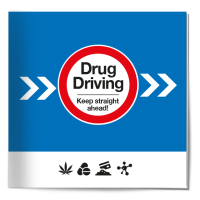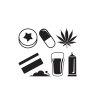DRUG-IMPAIRED DRIVING
Explore our comprehensive guide on drug driving, covering the effects of drugs on driving, up-to-date legislation, and roadside testing. Learn what to expect if stopped by police and test positive for drugs.
DRUGS AND DRIVING DON'T MIX
In the latest government figures for road deaths, 147 drivers who died were found to have taken legal or illegal drugs - excluding alcohol.
This information explains the latest drug driving legislation, roadside testing procedures and what happens if you test positive for drugs.
DRUGS CHANGE THE WAY YOU DRIVE
Drugs change the way you feel. They will affect your perception of speed and distance and impair your judgment and reaction times, putting you and other road users at risk.
The effect of drugs on your driving will depend on which drugs you’ve used.
Cannabis
Drugs like cannabis can result in your reaction times becoming slower, so you’re less aware and less able to respond to hazards fast enough. Research using driver simulators found that cannabis makes drivers less able to steer accurately and more likely to react slower to another vehicle pulling out.
Cocaine
Stimulant drugs such as cocaine or amphetamine give you a feeling of increased confidence. They can cause erratic behaviour, such as driving too fast and taking risks, and, at the same time, reduce your ability to judge the situation accurately.
Heroin
Heroin and other opiate-type drugs have a sedative effect, slowing reaction times. They can also cause inappropriate responses, reduce coordination and your ability to think clearly.
Medicine
Some prescription and over-the-counter medicines can have side effects, which include drowsiness, blurred vision, dizziness, slowed movement etc.
DRUG DRIVING AND THE LAW
In March 2015, the government brought in a new offence of driving while over the limit specified for drugs in your system.
Section 5A is the new law and refers to ‘driving or being in charge of a vehicle with a concentration of a specified controlled drug above the permitted levels in your blood’. The law includes a number of illegal, and prescription drugs.
There are now two offences that relate to drug driving, as follows:
- Section 5A RTA 1988
- Section 4 RTA 1988
The previous Section 4 law (which still exists) concerns driving, attempting to drive, or being in charge of a motor vehicle while unfit - whether you’re over the limit or not.
Section 5A makes it easier to successfully prosecute drug driving offences because the court doesn’t have to prove impairment, as it has had to do under the Section 4 law. It will reduce the time and money spent on prosecutions, improve road safety and deter drug driving.
Permitted levels
Section 5A takes a zero-tolerance approach to the listed drugs. The limits are set so any claims of accidental exposure can be ruled out (no excuses that your mate was smoking cannabis close to you, and you just inhaled it).
Your driving doesn’t have to be impaired for you to be charged with this offence. You just have to be over the permitted levels.
Being in charge
It’s also an offence if you’re ‘in charge of a motor vehicle when under the influence of drugs’. This essentially means you could be parked up in your car and still be prosecuted if you are over the limit.
What drug driving charge will you face?
If your blood drug level is above the permitted levels, you will be charged with the Section 5A offence.
If you’re above the permitted levels and your driving is impaired, you’re likely to be charged with the Section 5A offence.
If it’s below the permitted level, but there is sufficient evidence of impairment, you’re likely to be charged with the Section 4 offence of being unfit to drive.
PERMITTED DRUG LEVELS
These are the drugs, and their permitted levels, which are currently covered by the new Section 5A law.
The levels are measured in microgrammes per litre of blood (µg), and are very small amounts.
| Illegal drugs | Amount |
|---|---|
cocaine | 10µg |
cannabis | 2µg |
ketamine | 20µg |
LSD | 1µg |
methylamphetamine | 10µg |
Ecstasy/MDMA | 10µg |
heroin | 5µg |
| Prescription drugs | Amount |
|---|---|
Amphetamine | 250µg |
Clonazepam | 50µg |
Diazepam | 550µg |
Flunitrazepam | 300µg |
Lorazepam | 100µg |
Methadone | 500µg |
Morphine | 80µg |
Oxazepam | 300µg |
Temazepam | 1,000µg |
Prescription drugs
You can drive after taking prescription drugs under the following circumstances:
- You’ve been prescribed them and followed the advice of a healthcare professional on how to take them.
- They are not causing you to be unfit to drive even if you’re above the specified limits.
How long can drugs be detected in your system?
It’s difficult to say with any degree of accuracy how long drugs are still detectable in your system*.
If you’re a regular cannabis user, it might take many days before it’s left your system and is no longer detectable.
A single line of cocaine could be detectable 12 hours later. Benzoylecgonine, a by-product of cocaine use, is reportedly detectable for 30 hours, or even several days for some regular users.
Many factors affect the speed at which your body processes and eliminates drugs, such as the following:
- sex
- age
- build
- dose
- how often you use drugs
*Be aware that you may always have detectable levels of drugs in your blood if you use drugs regularly.
BEING STOPPED BY THE POLICE
The police can stop a vehicle for any reason. If they signal you to stop, you should always pull over when it’s safe to do so. You’re breaking the law if you don’t stop.
The police can conduct a roadside screening test or a field impairment test, both of which may result in your arrest under these circumstances:
- they think you’ve taken drugs
- you’ve committed a traffic offence
- you’ve been involved in a road traffic collision
Officers can test for cannabis and cocaine at the roadside, and screen for other drugs – including ecstasy, LSD, ketamine and heroin – at a police station.
Positive test
If the test is positive for drugs, you will be arrested and taken to a police station for a blood test.
A blood test can detect a broader range of drugs, provide an accurate reading of drug levels, and can be used as evidence in any future prosecution.
Even if you pass the roadside test, you may still be arrested and taken to a police station for further investigation if the police suspect that drugs have impaired your driving.
Giving a blood sample
When you arrive at the police station, a doctor or health care professional will take a blood sample.
They’ll send off one sample for testing and give you another so you can run your own independent test at an approved lab.
If you don’t provide the blood sample and have no reasonable medical excuse for failing to comply, you could be charged with ‘failure to provide’ and banned from driving and/or fined.
DRUG DRIVING PENALTIES
If you’re found guilty of drug driving, you’ll face several legal penalties, including the following:
- an automatic 12-month driving ban which could be extended depending on your circumstances and prior history of offending, and an unlimited fine
- a community sentence, which might include community service, a curfew requirement or mandatory rehabilitation treatment
- a prison sentence of up to six months, in the most serious cases
Aggravating circumstances, such as the following, will increase the penalties:
- you were driving for work, whether that’s driving a taxi, bus or making deliveries
- you had more than one drug in your system
- your standard of driving was poor
- you were driving near a school
The penalty for causing death by dangerous driving under the influence of drugs is a maximum prison sentence of 14 years.
Your License
Driving insurance
A drug-driving conviction will dramatically affect insurance options. Many insurers won’t provide cover after a conviction or, those that do, are likely to hike your premiums considerably.
Travel
More drug driving information
-
GOV.UK:
Government website containing the latest up-to-date information on drug driving law -
THINK!:
Campaigning website for safer roads -
Release:
Release is the national centre of expertise on drugs and drugs law. The organisation, founded in 1967, is an independent and registered charity.













